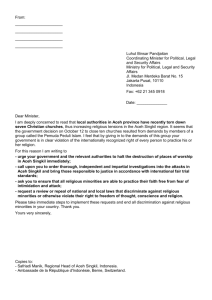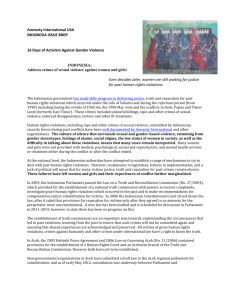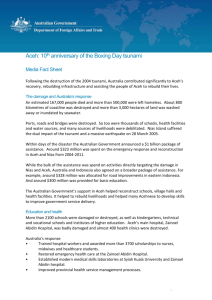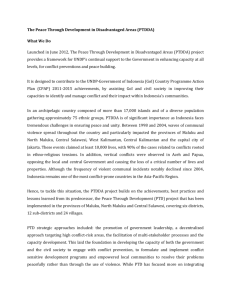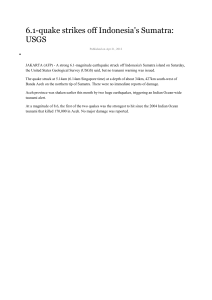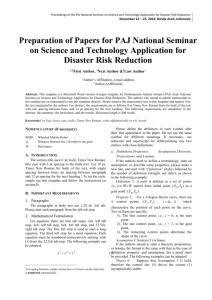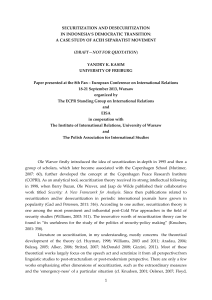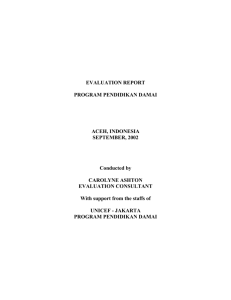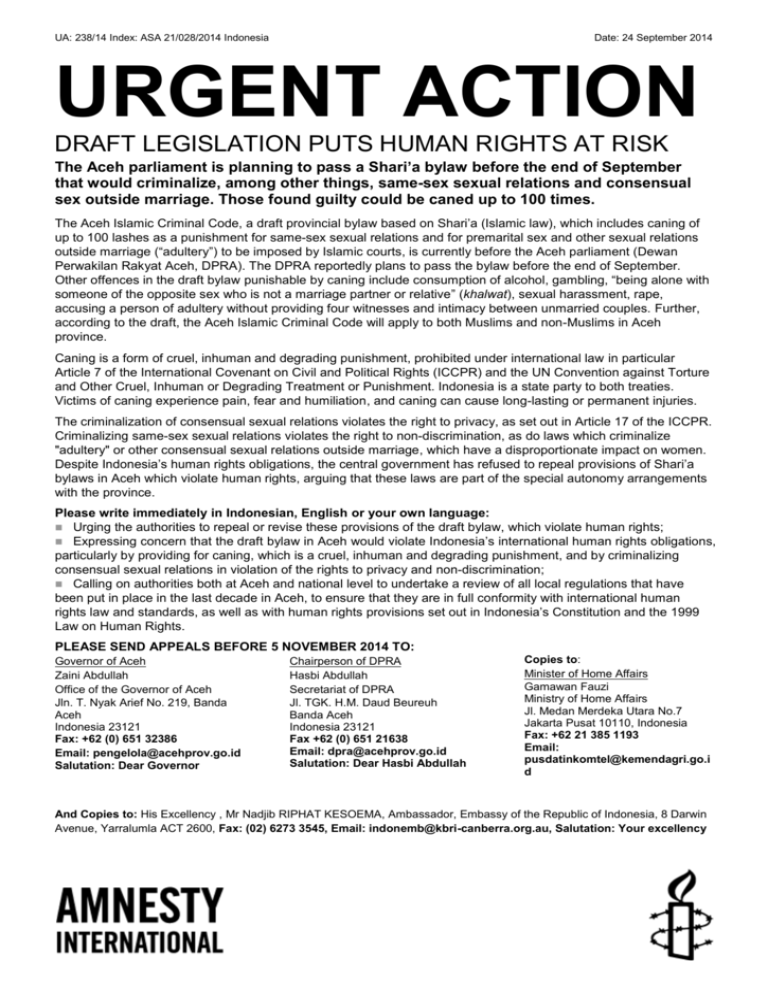
UA: 238/14 Index: ASA 21/028/2014 Indonesia
Date: 24 September 2014
URGENT ACTION
DRAFT LEGISLATION PUTS HUMAN RIGHTS AT RISK
The Aceh parliament is planning to pass a Shari’a bylaw before the end of September
that would criminalize, among other things, same-sex sexual relations and consensual
sex outside marriage. Those found guilty could be caned up to 100 times.
The Aceh Islamic Criminal Code, a draft provincial bylaw based on Shari’a (Islamic law), which includes caning of
up to 100 lashes as a punishment for same-sex sexual relations and for premarital sex and other sexual relations
outside marriage (“adultery”) to be imposed by Islamic courts, is currently before the Aceh parliament (Dewan
Perwakilan Rakyat Aceh, DPRA). The DPRA reportedly plans to pass the bylaw before the end of September.
Other offences in the draft bylaw punishable by caning include consumption of alcohol, gambling, “being alone with
someone of the opposite sex who is not a marriage partner or relative” (khalwat), sexual harassment, rape,
accusing a person of adultery without providing four witnesses and intimacy between unmarried couples. Further,
according to the draft, the Aceh Islamic Criminal Code will apply to both Muslims and non-Muslims in Aceh
province.
Caning is a form of cruel, inhuman and degrading punishment, prohibited under international law in particular
Article 7 of the International Covenant on Civil and Political Rights (ICCPR) and the UN Convention against Torture
and Other Cruel, Inhuman or Degrading Treatment or Punishment. Indonesia is a state party to both treaties.
Victims of caning experience pain, fear and humiliation, and caning can cause long-lasting or permanent injuries.
The criminalization of consensual sexual relations violates the right to privacy, as set out in Article 17 of the ICCPR.
Criminalizing same-sex sexual relations violates the right to non-discrimination, as do laws which criminalize
"adultery" or other consensual sexual relations outside marriage, which have a disproportionate impact on women.
Despite Indonesia’s human rights obligations, the central government has refused to repeal provisions of Shari’a
bylaws in Aceh which violate human rights, arguing that these laws are part of the special autonomy arrangements
with the province.
Please write immediately in Indonesian, English or your own language:
Urging the authorities to repeal or revise these provisions of the draft bylaw, which violate human rights;
Expressing concern that the draft bylaw in Aceh would violate Indonesia’s international human rights obligations,
particularly by providing for caning, which is a cruel, inhuman and degrading punishment, and by criminalizing
consensual sexual relations in violation of the rights to privacy and non-discrimination;
Calling on authorities both at Aceh and national level to undertake a review of all local regulations that have
been put in place in the last decade in Aceh, to ensure that they are in full conformity with international human
rights law and standards, as well as with human rights provisions set out in Indonesia’s Constitution and the 1999
Law on Human Rights.
PLEASE SEND APPEALS BEFORE 5 NOVEMBER 2014 TO:
Governor of Aceh
Zaini Abdullah
Office of the Governor of Aceh
Jln. T. Nyak Arief No. 219, Banda
Aceh
Indonesia 23121
Fax: +62 (0) 651 32386
Email: pengelola@acehprov.go.id
Salutation: Dear Governor
Chairperson of DPRA
Hasbi Abdullah
Secretariat of DPRA
Jl. TGK. H.M. Daud Beureuh
Banda Aceh
Indonesia 23121
Fax +62 (0) 651 21638
Email: dpra@acehprov.go.id
Salutation: Dear Hasbi Abdullah
Copies to:
Minister of Home Affairs
Gamawan Fauzi
Ministry of Home Affairs
Jl. Medan Merdeka Utara No.7
Jakarta Pusat 10110, Indonesia
Fax: +62 21 385 1193
Email:
pusdatinkomtel@kemendagri.go.i
d
And Copies to: His Excellency , Mr Nadjib RIPHAT KESOEMA, Ambassador, Embassy of the Republic of Indonesia, 8 Darwin
Avenue, Yarralumla ACT 2600, Fax: (02) 6273 3545, Email: indonemb@kbri-canberra.org.au, Salutation: Your excellency
URGENT ACTION
DRAFT LEGISLATION PUTS HUMAN RIGTHS AT RISK
ADDITIONAL INFORMATION
As part of the decentralization process which started in 1999–2000, and special autonomy packages for certain provinces in
Indonesia, there has been an increase in locally enacted bylaws and regulations on a number of issues, such as health,
education and family affairs. At the same time local and provincial government authorities in many parts of Indonesia have used
these powers to legislate on regulations and bylaws that discriminate against women and religious minorities. Aceh’s provincial
legislature passed a series of bylaws governing the implementation of Shari’a law after the enactment of the province’s Special
Autonomy Law in 2001.
Caning was introduced as a punishment to be imposed by Islamic courts for a range of offences including sexual relations
outside marriage (“adultery”), consumption of alcohol, being alone with someone of the opposite sex who is not a marriage
partner or relative (khalwat), and for any Muslim found eating or drinking during sunlight hours in the fasting month of Ramadan
or anyone that “facilitates” a Muslim not to fast during this month.
At least 156 people have been caned in Aceh since 2010: in 2010 at least 16 people were caned for gambling, khalwat and
selling food during the Ramadan fasting month; in 2011 at least 72 people were caned for alcohol consumption, gambling and
khalwat; in 2012 at least 43 people were caned for gambling and khalwat; in 2013, at least 8 people were caned for gambling;
until 22 September 2014, at least 17 people have been caned for gambling. In 2009, the Aceh parliament (DPRA) passed the
Aceh Islamic Criminal Code (Qanun Hukum Jinayat) which provided for stoning to death for “adultery” and caning of up to 100
lashes for same-sex sexual relations and premarital sex. However, the Aceh Governor refused to approve this code and it was
not implemented, in part because of intense criticism at local, national, and international levels. The stoning sentence which was
initially included in the revision of the code has since been removed. However the current draft continues to impose caning as a
form of punishment.
The UN Human Rights Committee and the UN Committee against Torture have both explicitly called on states to abolish caning
and other forms of corporal punishment. Specifically, in 2008 the Committee against Torture called on Indonesia to review all
national and local legislation that authorizes the use of corporal punishment as criminal sanctions, with a view to the immediate
abolition of such punishments. In 2013 the Human Rights Committee called on Indonesia to take practical steps to put an end to
corporal punishment and to repeal the provisions of the Acehnese law permitting its use in the penal system. In addition to
violating international law, caning is contrary to the human rights provisions set out in the Indonesian Constitution and in the
country’s 1999 Law on Human Rights.
The UN Human Rights Committee has repeatedly called for the repeal of laws criminalizing consensual same-sex sexual
relations which violate the right to privacy and the right to non-discrimination. Similarly the UN Human Rights Committee and
other expert human rights bodies have raised concern about laws criminalizing "adultery" or other consensual sexual relations
outside marriage not only because they violate the right to privacy but also because they are discriminatory, having a
disproportionate impact on women. Further, the human rights obligations of the Indonesian authorities apply to Indonesian laws
and practices at whatever level – national, regional or local – and the central government must ensure that human rights are
respected in all its provinces and autonomous regions whatever the internal governance arrangements. Under international law,
states may not invoke the provisions of internal law as justification for their failure to comply with their international human rights
obligations.
Name:
Gender m/f:
If sending appeals after the date given in the section “PLEASE SEND YOUR APPEALS BEFORE…”, then please check with
urgentaction@amnesty.org.au. Otherwise, please do not send your appeal.
If you receive a response to your appeal there is no need to reply. Please send it on to the Individuals at Risk Program (IARP).
Post: IARP - Urgent Actions, Locked Bag 7, Collingwood, Victoria, 3066
Email: urgentaction@amnesty.org.au
Fax: 03 9412 0720
Please note with your response which Urgent Action (UA number eg UA 123/10) the response relates to.
Your response will be sent directly to the staff in Amnesty International’s International Secretariat in London working for that particular case.
The responses you receive to your appeals are important for our ongoing work for individuals at risk.
UA: 238/14 Index: ASA 21/028/2014 Issue Date: 24 September 2014

